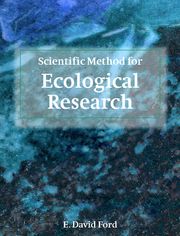Book contents
- Frontmatter
- Contents
- Preface
- Acknowledgements
- 1 Component processes of ecological research
- Introduction to Section I: Developing an analytical framework
- 2 Five processes of research planning
- 3 Conceptual and propositional analysis for defining research problems
- 4 Development of a research plan
- 5 How theories develop and how to use them
- 6 The art of measurement and experiment
- 7 Methods of reasoning in research
- 8 Assessment of postulates
- 9 Individual philosophies and their methods
- Introduction to Section II: Making a synthesis for scientific inference
- Introduction to Section III: Working in the research community
- Introduction to Section IV: Defining a methodology for ecological research
- Appendix: Suggestions for instructors
- References
- Glossary
- Author index
- Subject index
8 - Assessment of postulates
Published online by Cambridge University Press: 08 January 2010
- Frontmatter
- Contents
- Preface
- Acknowledgements
- 1 Component processes of ecological research
- Introduction to Section I: Developing an analytical framework
- 2 Five processes of research planning
- 3 Conceptual and propositional analysis for defining research problems
- 4 Development of a research plan
- 5 How theories develop and how to use them
- 6 The art of measurement and experiment
- 7 Methods of reasoning in research
- 8 Assessment of postulates
- 9 Individual philosophies and their methods
- Introduction to Section II: Making a synthesis for scientific inference
- Introduction to Section III: Working in the research community
- Introduction to Section IV: Defining a methodology for ecological research
- Appendix: Suggestions for instructors
- References
- Glossary
- Author index
- Subject index
Summary
Summary
Most frequently in ecology statistical analysis rather than propositional logic is used in assessing postulates. However, a clear distinction must be made between calculating a statistic for some observed data, e.g., a correlation coeYcient, where there was no formal hypothesis prior to the investigation, and making a hypothesis test. Postulate assessment through hypothesis testing should be an explicit and acknowledged procedure and must be made in the context of what the postulate means for the whole theory. Premature testing must be avoided and exploratory analysis should be used to refine a postulate and the hypotheses that can be constructed for it up to the stage where testing is appropriate.
Exploratory analysis is used to clarify the meaning of the postulate. The scope of the postulate must be determined and its quantitative and relational concepts defined. Preliminary measurements may be used, sometimes in conjunction with further conceptual analysis. Exploratory analysis must be used to investigate the possibility of confounding, where there are hidden or mixed relationships in data.
To use the theory of statistical inference the investigation and data obtained must satisfy the assumptions that statistical theory makes. An example is given of the elementary probability law, based on the normal distribution, combined with the concepts of observation, universe, sample, independence of observations, random sample, statistic, and degrees of freedom. Each of these concepts is defined in this chapter, the possibility of bias occurring is discussed, and the type of exploratory analysis they require is described.
- Type
- Chapter
- Information
- Scientific Method for Ecological Research , pp. 203 - 234Publisher: Cambridge University PressPrint publication year: 2000



